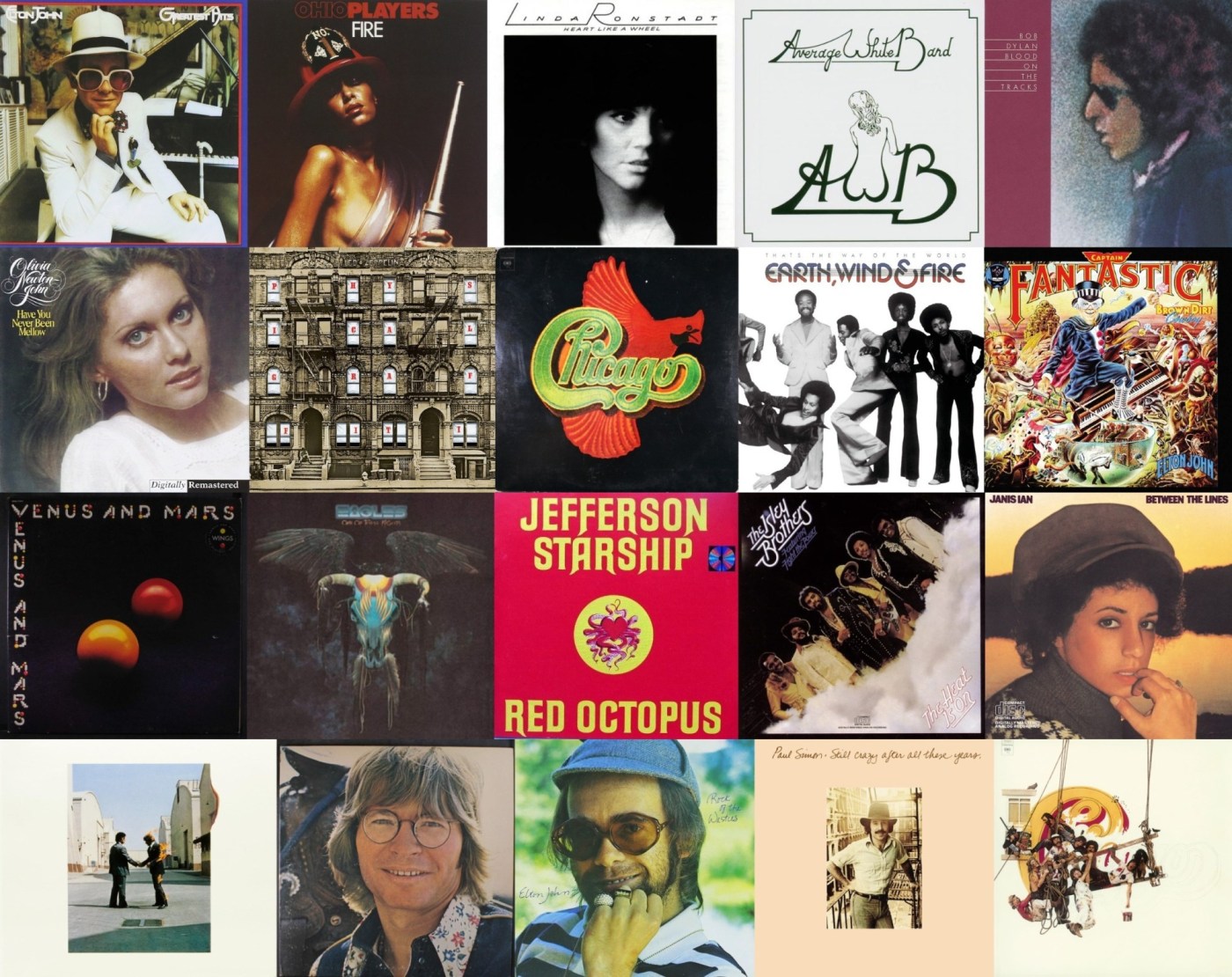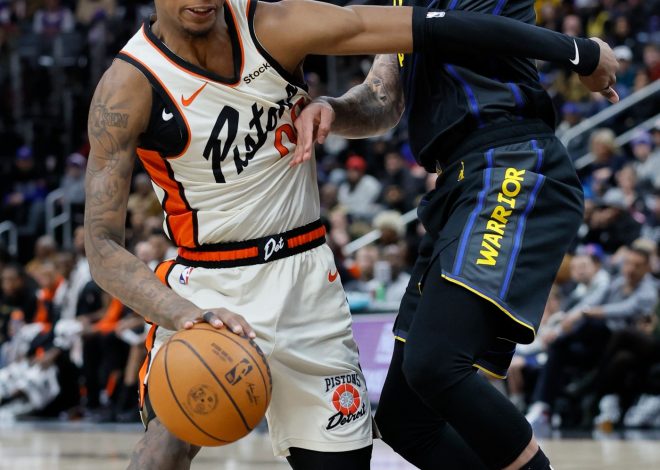
50 Years Later: How 1975’s No. 1 albums hold up after a half-century
In 1975, familiar faces dominated the album charts as artists including Elton John, Chicago, Paul McCartney and Olivia Newton-John — all of whom had No. 1 albums the previous year — returned to the top of the Billboard 200 with new records.
Related Articles
Peter Yarrow of folk music trio Peter, Paul and Mary dies at 86
Looking forward 2025: Metallica, Kendrick Lamar, SZA and more heading to Bay Area
Wayne Osmond, singer and guitarist for The Osmonds, is dead at 73
Jennifer Lopez ‘needs to go away’ after a losing 2024, industry experts say
Legendary punk rock band descends on Bay Area for several concerts
Twenty different albums by 17 different artists reached No. 1 on the album chart in 1975. And as the decade reached its midpoint, the ’60s and early ’70s continued to dominate album sales.
A range of veteran artists from Bob Dylan and a pair of former Beatles to the pop rock of Elton John and Chicago all reached No. 1 in 1975, while future icons such as Bruce Springsteen, Fleetwood Mac and David Bowie released acclaimed albums that didn’t reach the top spot during the year.
We’ve got a lot to talk about so without further adieu let’s get this flashback flashin’.
“Elton John’s Greatest Hits” opened 1975 with five weeks at No. 1 on the album charts. (Photo courtesy of the record labels)
“Elton John’s Greatest Hits,” Elton John / Weeks at No. 1: 5
Few artists have enjoyed the massive success enjoyed by Elton John in the ’70s and this collection demonstrates that point perfectly. “Greatest Hits” closed out 1974 with five weeks atop the Billboard 200 album chart and stuck around at No. 1 for the first five weeks of the new year. Ten consecutive weeks at No. 1, one for each of its 10 classic tracks which included such indelible hits as “Your Song,” “Goodbye Yellow Brick Road,” “Rocket Man” and “Crocodile Rock.”
New and noteworthy: Jazz pianist Keith Jarrett’s performance in Cologne, Germany on Jan. 24 was recorded for the double-live album “The Köln Concert.” Released later in 1975 it is the best-selling solo jazz album of all time.
The Ohio Players’ “Fire” reached No. 1 on the album charts for one week in 1975. (Photo courtesy of the record labels)
“Fire,” Ohio Players / Weeks at No. 1: 1
The second of the group’s three platinum-selling albums — “Skin Tight” before it, “Honey” to follow — is best-remembered for the propulsive funk and slinky grooves of its incendiary title track. (Well, that and the group’s typically sexy album cover art.) But there’s more to enjoy than you might remember, with tracks such as “Runnin’ From the Devil” almost matching the funkiness of “Fire” and slower soul jams including “Together” and “I Want to Be Free.”
New and noteworthy: Canadian prog-rockers Rush delivered its sophomore album “Fly By Night,” which didn’t make an immediate impact though its addition of new drummer and lyricist Neil Peart would soon elevate the band to its peak performance.
Linda Ronstadt’s “Heart Like a Wheel” reached No. 1 on the album charts for one week in 1975. (Photo courtesy of the record labels)
‘Heart Like a Wheel,” Linda Ronstadt / Weeks at No. 1: 1
The moment the needle drops on the opening track “You’re No Good,” it’s clear that with her fifth solo album Linda Ronstadt had leveled up to the top tier of stardom. A collection of country-tingled pop-rock classics, “Heart Like a Wheel” includes her classic renditions of songs such as the Everly Brothers’ “When Will I Be Loved,” the James Carr classic “The Dark End of the Street,” and Lowell George’s outlaw trucker anthem “Willin’.”
New and noteworthy: John Lennon paid tribute to his early inspirations on “Rock ‘n’ Roll,” a covers album of rock songs from the pre-Beatles era. The sessions were hampered by the increasingly erratic behavior of producer Phil Spector who infamously fired a gun into the ceiling of the recording studio during one session.
The Average White Band’s “AWB” reached No. 1 on the album charts for one week in 1975. (Photo courtesy of the record labels)
“AWB,” Average White Band / Weeks at No. 1: 1
This is the album that taught the world that Scottish soul and funk was a thing that existed. When its single “Pick Up the Pieces” soared up the charts to No. 1 the same week that the album topped the charts, many listeners were surprised to learn of the musicians’ origins in the land of kilts and haggis. Later in the year, the band returned with “Cut the Cake,” which reached No. 4.
New and noteworthy: Alice Cooper released his debut solo album “Welcome to My Nightmare.” The album art was done by the acclaimed album and movie poster artist Drew Struzan, whose work you’ll know from early “Star Wars” posters among many other things.
Bob Dylan’s “Blood on the Tracks” reached No. 1 on the album charts for two weeks in 1975. (Photo courtesy of the record labels)
“Blood on the Tracks,” Bob Dylan / Weeks at No. 1: 2
Great art doesn’t always sell, at least not at first, but here one of Dylan’s finest was rewarded a month or two after its release with sales strong enough to send it to No. 1 for two weeks. Songs included “Tangled Up in Blue,” “Simple Twist of Fate,” and “Shelter From the Storm.” Many saw parallels between the lyrics and Dylan’s troubled marriage. However, Dylan, the most opaque and unreliable narrator of his life, has denied any autobiographical elements.
New and noteworthy: The 17th annual Grammy Awards were held in New York City. Stevie Wonder took album of the year for “Fulfillingness’ First Finale,” after which softer sounds snared the other big prizes: Olivia Newton-John’s “I Honestly Love You” for record of the year, Barbra Streisand‘s “The Way We Were” as song of the year, and Marvin Hamlisch as best new artist.
Olivia Newton-John’s “Have You Never Been Mellow” reached No. 1 on the album charts for one week in 1975. (Photo courtesy of the record labels)
“Have You Never Been Mellow,” Olivia Newton-John / Weeks at No. 1: 1
Olivia Newton-John earned her second No. 1 in two years with “Have You Never Been Mellow,” a highlight of mid-’70s gossamer pop that is carried by Newton-John’s pretty crystalline vocals and, well, mellow arrangements. The title track, which also reached No. 1 on the singles chart, and songs such as “Loving Arms” and “Please Mr. Please” all equally sweet musical confections.
New and noteworthy: David Bowie, setting aside his glam rock personas, released the Philly Soul-inspired album “Young Americans,” which delivered his first No. 1 single in the United States with “Fame.”
Led Zeppelin’s “Physical Graffiti” spent six weeks at No. 1 on the album charts in 1975. (Photo courtesy of the record labels)
“Physical Graffiti,” Led Zeppelin / Weeks at No. 1: 6
Here, after Dylan’s “Blood on the Tracks,” is the second classic album of ’75. The double album, which featured a mix of new songs and ideas the band had been working on for earlier projects, thrilled fans with its unique die-cut album cover, and stayed at No. 1 for six weeks. Songs such as “Kashmir,” “In My Time of Dying,” “Trampled Under Foot” and “Black Country Woman” became staples of Zeppelin sets, with the latter two often still in singer Robert Plant’s sets.
New and noteworthy: As Zeppelin roosted at No. 1, a handful of other significant LPs arrived. Aerosmith’s “Toys in the Attic” introduced listeners to “Sweet Emotion” and “Walk This Way.” ABBA’s self-titled third album included “Mamma Mia” and “SOS.” ZZ Top’s “Fandango” included the classic track “Tush.”
“Chicago VIII” spent two weeks at No. 1 on the album charts in 1975. (Photo courtesy of the record labels)
“Chicago VIII,” Chicago / Weeks at No. 1: 2
Like Elton John, Chicago enjoyed an incredible run of chart success in the ’70s. “Chicago VIII” became its fourth consecutive No. 1 album with one more coming later in 1975 to make five straight No. 1s for Chicago before the streak was broken. Even so, it lacks the hits of past and future albums, with “Old Days” its most remembered track today.
New and noteworthy: James Taylor’s “Gorilla” included enduring fan favorites “Mexico” and “How Sweet It Is (To Be Loved By You).” Willie Nelson released the classic country concept album “Red-Headed Stranger.” And Captain & Tennille delivered their debut album, “Love Will Keep Us Together,” the title track of which shot to No. 1.
Earth, Wind and Fire’s “That’s the Way of the World” spent three weeks at No. 1 on the album charts in 1975. (Photo courtesy of the record labels)
“That’s the Way of the World,” Earth, Wind & Fire / Weeks at No. 1: 3
Opening track “Shining Star” is one of Earth, Wind & Fire’s biggest hits, as is the title track which follows, and the rest of the record if not as stellar still shines mighty bright. The LA Weekly review described it as “serious romantic music to wear silk bellbottom slacks to.” Rolling Stone later called it “make-out music of the gods.” The group’s first No. 1, it sparked a run of six consecutive albums that reached the Top 10.
New and noteworthy: The Rolling Stones cleaned out the cupboards with a pair of albums in early June as they ditched former manager Allen Klein and Decca Records for a new deal with Atlantic Records. Klein and Decca put together “Metamorphosis,” a collection of outtakes and alternate versions. Atlantic delivered, “Made in the Shade,” a greatest hits collection drawn from the Stones’ early ’70s albums.
Elton John’s “Captain Fantastic and the Brown Dirt Cowboy” spent seven weeks at No. 1 on the album charts in 1975. (Photo courtesy of the record labels)
“Captain Fantastic and the Brown Dirt Cowboy,” Elton John / Weeks at No. 1: 7
With this one, Elton John and lyricist Bernie Taupin made history as the record went gold before its release and reached No. 1 in its first week of release, the first time either of those things had happened. An autobiographical concept album about John and Taupin’s early years together, it only produced one big single, “Someone Saved My Life Tonight,” but track-by-track it is one of John and Taupin’s strongest collections.
New and noteworthy: As “Captain Fantastic” settled at No. 1 in June and July 1975, the summer delivered other gems. War’s “Why Can’t We Be Friends?” provided hits with the title track and “Low Rider.” Neil Young released his grief-drenched classic “Tonight’s The Night.” And Bob Dylan and the Band delivered an official release of the long-bootlegged sessions known as “The Basement Tapes.”
Wings’ “Venus and Mars” spent one week at No. 1 on the album charts in 1975. (Photo courtesy of the record labels)
“Venus and Mars,” Wings / Weeks at No. 1: 1
The follow-up to “Band on the Run,” Wings’ 1974 No. 1 album, “Venus and Mars” is a fine album if not as beloved as its predecessor. With “Listen to What the Man Said,” Paul McCartney added to his catalog of sweetly earnest love songs. It reached No. 1 on the singles chart and album-opener “Venus and Mars/Rock Show” climbed to just outside the Top 10.
New and noteworthy: Fleetwood Mac released its second self-titled album and first with new members Stevie Nicks and Lindsey Buckingham joining Mick Fleetwood and John and Christine McVie to form the group’s classic lineup. As songs such as “Rhiannon,” “Over My Head,” “Say You Love Me,” and “Landslide” worked their way into radio playlists the album slowly climbed to No. 1 — in September 1976, 15 months after its release.
Eagles’ “One of These Nights” spent five weeks at No. 1 on the album charts in 1975. (Photo courtesy of the record labels)
“One of These Nights,” Eagles / Weeks at No. 1: 5
The Eagles‘ fourth album delivered the breakthrough the band’s previous records had been building to. Propelled by singles including the title track, “Lyin’ Eyes,” and “Take It to the Limit,” the band scored its first No. 1 album. This was also the final album with the Eagles’ original lineup as Bernie Leadon left the band and was replaced by guitarist Joe Walsh.
New and noteworthy: Lou Reed gave the world “Metal Machine Music,” an album that could not be farther from the Eagles’ sweet harmonies and gentle melodies. A Rolling Stone reviewer compared it to “the tubular groaning of a galactic refrigerator” and if you’ve ever heard it you know how accurate that is. Sweeter sounds arrived thanks to Heart’s debut album “Dreamboat Annie” and Donna Summer’s “Love to Love You Baby.”
Jefferson Starship’s “Red Octopus” spent four weeks at No. 1 on the album charts in 1975. (Photo courtesy of the record labels)
“Red Octopus,” Jefferson Starship / Weeks at No. 1: 4
With former member Marty Balin back in the band with Grace Slick, Paul Kantner and other Jefferson Airplane and Starship colleagues, “Red Octopus” reinvigorated the band born of the ’60s counterculture scene in San Francisco. Balin’s song “Miracles” is the highlight, but there were enough other good songs on the record to give if four non-consecutive weeks at No. 1.
New and noteworthy: Bruce Springsteen’s “Born to Run” arrived just before “Red Octopus” topped the chart, and if you’re thinking, Oh, that must have reached No. 1 soon after, you’d be mistaken. Somehow an album generally acclaimed as one of the greatest rock records of all time only made it to No. 3.
Th Isley Brothers’ “The Heat Is On” spent one week at No. 1 on the album charts in 1975. (Photo courtesy of the record labels)
“The Heat Is On,” the Isley Brothers / Weeks at No. 1: 1
In a year where the Ohio Players and Earth, Wind and Fire topped the album chart with funky soulful albums, the Isley Brothers’ first No. 1 album isn’t as well known as “Fire” or “That’s the Way of the World.” That’s a shame, too, because “The Heat Is On” is a fantastic album with songs such as “Fight the Power (Part 1&2)” and “For the Love of You (Part 1&2).”
New and noteworthy: Kiss’s fourth album, “Alive!” helped the hard rockers break through as the live versions of its songs captured more of the band’s energy than their studio work had to date. Foghat’s “Fool for the City” served up its signature song in “Slow Ride.”
Janis Ian’s “Between the Lines” reached No. 1 on the album charts in 1975. (Photo courtesy of the record labels)
“Between the Lines,” Janis Ian / Weeks at No. 1: 1
Janis Ian’s seventh album is a lovely collection of singer-songwriter numbers with its big hit, “At Seventeen,” the delicate standout of the set. Win a bar bet with this little nugget: Ian performed “At Seventeen” on the first-ever episode of “Saturday Night Live” when that still-running late-night sketch comedy show premiered on Oct. 11, 1975.
New and noteworthy: Beatle George Harrison became the third member of that band to release a solo record in 1975 with “Extra Texture.” The single “You” was a modest hit. Electric Light Orchestra delivered “Face The Music,” which included the singles “Evil Woman” and “Strange Magic.” And the Bay City Rollers got their first U.S. album release with a self-titled compilation.
Pink Floyd’s “Wish You Were Here” spent two weeks at No. 1 on the album charts in 1975. (Photo courtesy of the record labels)
“Wish You Were Here,” Pink Floyd / Weeks at No. 1: 2
Two years after “Dark Side of the Moon,” Pink Floyd returned with “Wish You Were Here,” which while not as popular or acclaimed as its predecessor at the time has only grown in stature in the decades since. Tracks such as the “Shine On You Crazy Diamond” suite and the title track remain fan favorites and show up in sets today when Floyd’s David Gilmour and Roger Waters embark on solo tours.
New and noteworthy: As Pink Floyd reached No. 1, The Who released “The Who By Numbers.” The Who’s single, “Squeeze Box,” made the Top 20, but the album also includes gems such as “Blue, Red and Grey” scattered across its grooves. Guitarist-singer Pete Townsend was a little down during the making of the record, having turned 30 in May 1975.
John Denver’s “Windsong” spent two weeks at No. 1 on the album charts in 1975. (Photo courtesy of the record labels)
“Windsong,” John Denver / Weeks at No. 1: 2
John Denver scored his second No. 1 album in two years with “Windsong,” which included the double-sided single “I’m Sorry” and “Calypso.” With Janis Ian and Olivia Newton-John, the latter of whom contributed vocals to “Windsong,” Denver’s album proved that softer, folk-based pop could succeed on the charts in the mid-’70s.
New and noteworthy: Roxy Music’s “Siren” included one of its most popular songs in “Love Is the Drug.” Tom Waits’ “Nighthawks at the Diner” perfected Waits’ jazz-blues hobo persona on an album that was recorded live with an audience at the Record Plant recording studio.
Elton John’s “Rock of the Westies” spent three weeks at No. 1 on the album charts in 1975. (Photo courtesy of the record labels)
“Rock of the Westies,” Elton John / Weeks at No. 1: 3
Elton’s Very Good Year concluded with “Rock of the Westies,” his third No. 1 of 1975. Recorded just five months after its predecessor, “Captain Fantastic and the Brown Dirt Cowboy,” songs such as “Island Girl,” “Grow Some Funk of Your Own,” and “I Feel Like a Bullet (In the Gun of Robert Ford)” made clear that the well of inspiration was nowhere near dry.
New and noteworthy: While Elton was hogging the top of the charts again a trio of significant albums showed up in record stores. Patti Smith delivered her debut album “Horses,” while Neil Young returned with a second album in ’75 with “Zuma.” Joni Mitchell released “The Hissing of Summer Lawns.” And Queen returned with “A Night at the Opera,” which included the massively popular “Bohemian Rhapsody” as well as “You’re My Best Friend” and more.
Paul Simon’s “Still Crazy After All These Years” reached No. 1 for one week on the album charts in 1975. (Photo courtesy of the record labels)
“Still Crazy After All These Years,” Paul Simon / Weeks at No. 1: 1
Paul Simon’s fourth solo album also included a reunion with former partner Art Garfunkel on “My Little Town,” which was also included on Garfunkel’s 1975 album “Breakaway.” The record also included the hits “50 Ways to Leave Your Lover” and “Gone At Last.” The title track only snuck into the Top 40 at No. 40 but it’s endured as one of Simon’s many great compositions.
New and noteworthy: Bob Marley’s “Live!” arrived and for the next decade or so there wasn’t a college dorm room somewhere in the world with it spinning on a turntable. Ringo Starr wrapped the year in Beatle solo albums with “Blast From Your Past,” a compilation album that was the last release on Apple Records until it was revived in the ’90s.
“Chicago IX: Chicago’s Greatest Hits” spent three weeks at No. 1 on the album charts in 1975. (Photo courtesy of the record labels)
“Chicago IX: Chicago’s Greatest Hits,” Chicago / Weeks at No. 1: 3
Chicago, which reached No. 1 with “Chicago VIII” in May, returned to the top spot to close out the year atop the charts with this compilation of terrific hits such as “25 or 6 to 4,” “Does Anybody Really Know What Time It Is?” “Colour My World,” and “Just You ‘n Me,” to name just the first four tracks on the record.
New and noteworthy: Parliament released “Mothership Connection” and everyone everywhere had to have that funk. Emmylou Harris delivered “Elite Hotel,” which became her first No. 1 country album as well as providing a pair of No. 1 country singles in her interpretations of Buck Owens’ “Together Again” and Patsy Cline’s “Sweet Dreams.”


